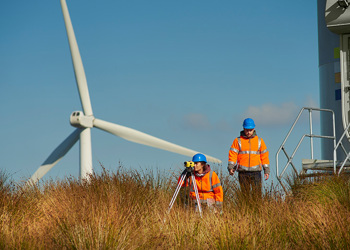Careers

The country’s aging energy infrastructure and the development of new technologies are driving major changes in the energy industry. This trend is sparking growth in the number and variety of jobs in this area of engineering.
A Growing Field
The ongoing transition from fossil fuels to renewable energy sources — wind, solar, hydropower and others — is fueling a rise in energy infrastructure jobs.
For example, according to a March 2025 article from the U.S. Bureau of Labor Statistics (BLS), employment in the utility sector’s four fastest-growing industries — solar electric power generation, wind electric power generation, other electric power generation, and geothermal electric power generation — are all projected to increase by more than 40 percent from 2023-33.
In addition, BLS lists wind turbine service technician as the fastest-growing occupation in the country, with a projected growth rate of 60.1% between 2023–2033.
Alumni Success
Graduates of this program work around the world at leading companies in the industry.
Alumni Job Titles
- Civil engineer
- Industrial engineer
- Chief executive
- Project manager
- Production, planning & expediting clerk
Alumni Employers
- PG&E
- Hitachi
- Rushing
- Dominion Energy
- Euclid Power
- Bureau of Reclamation